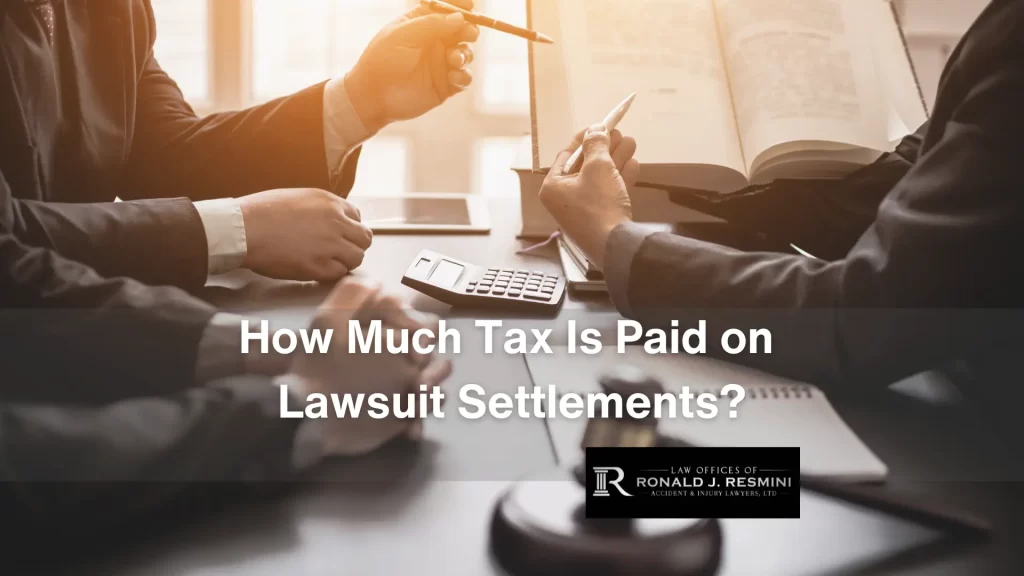 When the court holds individuals or entities liable in personal injury lawsuits, those liable parties must pay money to injured parties. Since that money covers losses and damages, it is not considered income and is mainly not taxable. There are exceptions, however – for example, money for punitive damages.
When the court holds individuals or entities liable in personal injury lawsuits, those liable parties must pay money to injured parties. Since that money covers losses and damages, it is not considered income and is mainly not taxable. There are exceptions, however – for example, money for punitive damages.
If you have been injured by a car accident, workplace accident, or similar situation due to someone else’s wrongful behavior, you could be entitled to substantial compensation for your losses, either from a trial award or out-of-court settlement. Generally, a substantial payout for pain and suffering losses and damages, will not be taxed. Punitive damages, however, can be taxed.
The good news is that you don’t have to deal with any confusion or challenges alone. At the Law Offices of Ronald J. Resmini, Accident & Injury Lawyers, Ltd., our attorneys work diligently to secure fair settlements that help our clients get their lives back on track. This means cutting thoughtful settlement deals that account for every eventuality, including the possibility of future tax payments.
Contact the Law Offices of Ronald J. Resmini, Accident & Injury Lawyers, Ltd. today at (401) 751-8855 for a free consultation to learn more about compensation from personal injury settlements and what kinds of taxes to expect on your payout.
How Much Tax Do You Pay on Injury Lawsuit Settlements?
The Internal Revenue Service (IRS) is responsible for collecting tax revenue and enforcing the federal tax code in the U.S. The IRS website includes sections that describe which types of settlements and court judgments should and shouldn’t be taxed.
In general, the IRS expects you to pay taxes on everything you receive unless it falls under an exemption. There are many exemptions for personal injury settlements, which can be found in the Internal Revenue Code (IRC) Section 104.
According to the IRS, your taxable income does NOT include the following:
- Settlement money you receive from claims involving unspecified physical injuries
- Benefit payments you receive from your employer’s workers’ compensation insurance
- Money you get through your health insurance for covered medical expenses
According to the IRS, taxable income may include:
- Non-physical injuries, such as emotional distress
- Punitive damages
Are Injury Lawsuit Settlements Ever Taxed?
It depends. The purpose of any compensation you get from a personal injury claim is to make you whole. No amount of money can erase the consequences you suffer from an injury accident. Still, a fair settlement or monetary judgment can give you the resources you need to recover as fully as possible. Since money from a personal injury claim is essentially replacing what you’ve lost, the government doesn’t consider most of the money as income and, therefore, won’t tax all of it.
However, some portions of injury settlements are taxable. The IRS allows exemptions for the compensation victims get for the costs of physical injuries and illnesses (e.g., medical bills and lost wages), but it can still tax compensation for non-physical injuries, such as emotional distress. You should always talk to your attorney about the specific rules regarding settlement exemptions before you settle any injury claim so you know what to expect.
Are Punitive Damages Taxable?
Yes. Rhode Island courts award punitive damages in rare injury cases involving egregious recklessness or intentional malice. Punitive damage awards go to victims in the form of monetary compensation. The primary reason why judges order punitive damages is to punish wrongdoers. This means punitive damage compensation does not count as compensation for physical injuries, so the IRS sees punitive damage awards as taxable income.
Should I Worry About Taxes After My Lawsuit Settlement?
 You should work with a knowledgeable attorney to consider how taxes could affect your settlement, but worrying isn’t necessary. Some people get stressed out when large payouts and taxes are on the line. However, even if you have to pay taxes on portions of your settlement, you will still walk away with far more money than you would pay in taxes. The best way to determine how tax obligations could affect your personal injury settlement is to consult an experienced local attorney before you settle.
You should work with a knowledgeable attorney to consider how taxes could affect your settlement, but worrying isn’t necessary. Some people get stressed out when large payouts and taxes are on the line. However, even if you have to pay taxes on portions of your settlement, you will still walk away with far more money than you would pay in taxes. The best way to determine how tax obligations could affect your personal injury settlement is to consult an experienced local attorney before you settle.
Contact a Providence Personal Injury Attorney
At the Law Offices of Ronald J. Resmini, Accident & Injury Lawyers, Ltd., we understand how difficult it is to get back on your feet after a serious injury accident. Let us worry about the details while you focus on recovering and returning to the things that matter.
Our firm never gets paid unless we win your case. So there’s no financial risk when you come to us for help. Call us today at (401) 751-8855 or fill out our online contact form for a free consultation.
Related posts:
